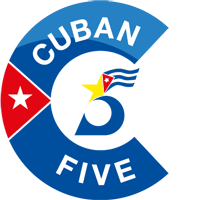|
JEAN-GUY ALLARD
IN Miami, a terrorist sanctuary established by the CIA for its dirty war on Latin America, the U.S. federal police, supposedly responsible for combating terrorism, overtly permit death threats and acts of terrorism when these are directed at Cuba. This is demonstrated by recent events, in particular, a threatening telephone call of various minutes to a well-known radio phone-in program from a listener who seemingly had no fear of being located and arrested by security services. The caller stated that the health of René González, one of the five Cubans detained by U.S. justice, should "be modified," instead of letting him return to his country, as he has requested. The incident – which if directed at some U.S. authority would have led to a police operation – took place on June 27 during "La tarde se mueve" program, when its host, Cuban Edmundo García, asked listeners what they thought about René González’ re-application to be deported to Cuba. Sixteen of the 25 calls received were in favor of René’s return, and 13 gave arguments in solidarity with the Cuban hero. However, two calls were overtly hostile and one of them included death threats. The following written version of the threatening call confirms that the listener wanted René González to remain in the United States in order to attack or kill him, and confirms a number of warnings made since his release from prison. González has to serve three years probation, a cruel and unjustified addition to his incarceration in a country which protects terrorists which it has trained and utilized and is punishing the five Cuban anti-terrorists who infiltrated the mafia which it generated. "Let him stay, I want him to stay, and the more he and his separated family suffer, the better for us, let him stay here," the caller, evidently an active member of the Miami terrorist fraternity, begins by saying. —Ah, and if he remains living in the United States you can…" says García, and the dialogue continues: —Caller: he’s not going to stay here, he’s not going to stay, look what happened to Airline Brokers, the same thing can happen to him. —E.G: Ah, ah, how interesting… —Caller: He’s not stupid, he knows that… —E.G: You are acknowledging an intention to harm him. —Caller: Of course, and with pleasure, of course… —E.G: You have just said that you would be disposed to him being murdered, right? —Caller: Let them modify (his health)… let what has to happen to him happen… Everyone knows that. —E.G: You have said that there are people here who want to harm him and kill him. —Caller: Of course, of course…" If these expressions of hatred had been uttered in any other city they could be taken as crazy words stated by an unbalanced person in a society where violence is predominant in many aspects of public life. But Miami is a special case which was and still is a privileged breeding ground of the U.S. intelligence community, home to hundreds of individuals, mostly of Cuban origin, who played a part in various acts of imperial aggression all over the continent. COMING AFTER THE ATTACK ON AIRLINE BROKERS This radio conversation occurred a few weeks after the attack on Airline Brokers, a travel agency specializing in visits to Cuba. This is a case which the FBI has been unable to clarify and it has failed to identify a single suspect, even though websites openly linked to terrorism have posted comments which indicate a suspicious knowledge of the crime. On the same day as the threatening call made to "La tarde se mueve," Ramón Saúl Sánchez Rizo, another anti-Castro activist, spoke on air for more than 60 minutes from La Poderosa de Miami radio station, giving his views on René González’ request. Sánchez Rizo concentrated on defaming the Cuban hero who, like his four compañeros, suffered years of incarceration in U.S. prisons. On many occasions they were the victims of mistreatment, noted and denounced by a UN commission of jurors Again, in any other city, Sánchez Rizo’s words and his semi-overt incitements to violence could be interpreted as just another eccentricity in a society characterized by excesses. But in Miami, his discourse carried a significance which would justify immediate intervention by authorities – in a nation which annually publishes a list of countries sponsoring terrorism in order to demonize its opponents. From 1970 to 1982, "Ramoncito" Sánchez Rizo successively belonged to the Frente de Liberación Cubano, the Abdala organization, Alpha 66, and Jóvenes de la Estrella. Files also place him in the Organización para la Liberación de Cuba, and Hubert Matos’ Cuba Independiente y Democrática, as well as in Omega 7. He then became a member of CORU, the organization which planned the sabotage in full flight of a Cubana de Aviación DC-10. A terrorist and killer, he was charged and imprisoned, but released on November 24, 1986, thanks to compliant decisions by the courts after approaches from U.S. intelligence. The death threats issued on "La tarde se mueve" and by Sánchez Rizo occurred in the same Florida city where the Five were sentenced to long prison terms after a rigged and manipulated trial. A trial at the end of which, in a surprise admission, Judge Joan Lenard acknowledged that authorities must know where these terrorist meet, and added to the sentences of American born René González and Antonio Guerrero a requirement "prohibiting them from associating with or visiting specific places where individuals or groups such as terrorists, members of organizations advocating violence, and organized crime figures are known to be or frequent." GRANMA
0 Comments
Your comment will be posted after it is approved.
Leave a Reply. |
Voices for the FiveArchives
May 2016
|
 RSS Feed
RSS Feed

